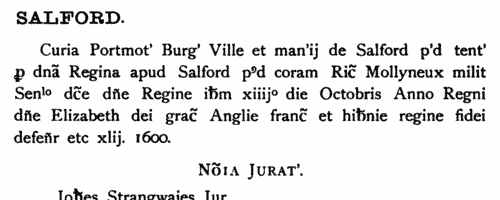Pilkynton Surname Ancestry ResultsOur indexes 1000-1999 include entries for the spelling 'pilkynton'. In the period you have requested, we have the following 5 records (displaying 1 to 5): Buy all | | | Get all 5 records to view, to save and print for £22.00 |
These sample scans are from the original record. You will get scans of the full pages or articles where the surname you searched for has been found. Your web browser may prevent the sample windows from opening; in this case please change your browser settings to allow pop-up windows from this site. Fine Rolls
(1369-1377)
The fine rolls of the 43rd to 51st years of the reign of king Edward III record part of the government administration in England, with orders sent out day by day to individual officers, and commitment of particular responsibilities and duties. There is also some material relating to Wales, Scotland, Ireland and the English possessions in France. PILKYNTON. Cost: £4.00.  | Sample scan, click to enlarge

| Grantees of offices, commissions and pardons
(1413-1416)
The Patent Rolls are the Chancery enrolments of royal letters patent. Those for the 1st, 2nd and 3rd years of the reign of king Henry V (21 March 1413 to 20 March 1416) were edited for the Public Record Office by R. C. Fowler, and published in 1910. The main contents are royal commissions and grants; ratifications of ecclesiastical estates; writs of aid to royal servants and purveyors; and pardons. The commissions of the peace issued for the English towns and counties and entered on the rolls, being largely repetitive, have been consolidated in a single appendix.PILKYNTON. Cost: £2.00.  | Sample scan, click to enlarge

| Lichfield Diocese Ordinations: Acolytes Secular
(1508)
The diocese of Coventry and Lichfield at this period included the whole of Cheshire, Staffordshire and Derbyshire; all Lancashire south of the Ribble; northern Shropshire (including Shrewsbury); and northern Warwickshire (including Birmingham and Coventry). Ordinations took place on the four Ember Saturdays in the year, and on certain other occasions; lists of ordinands to the degrees of acolyte, subdeacon, deacon and priest were preserved in the ordination registers, a distinction being made between those clerks who were 'regular', i. e., monks, friars, &c., and those who were 'secular', the main body of the clergy. All ordinands were celibate, and those regular, and the secular who obtained benefices, remained so, but only a minority of the secular ordinands ever obtained benefices, and most will doubtless have married later in life. No man might be ordained to subdeacon or higher without proving either that he was of independent means or that he was sponsored by an institution or a gentleman. Most entries in the register of such ordinations therefore have the words 'ad titulum' followed by the name of the religious house that was the sponsor. This is an important indication of the man's origins - boys whose families were monastic tenants, and who were educated by the monks, would naturally be sponsored by the abbey. Only men who were born and bred in the diocese could be ordained by the bishop, unless producing letters dimissory from the bishop of the diocese of their birth. These are the ordinations celebrated on Ember Saturday, 18 March 1508, by bishop Geoffrey Blythe, in Longdon prebendal church.PILKYNTON. Cost: £8.00.  | Sample scan, click to enlarge

| Salford Portmote
(1600)
The earliest surviving records of the portmote of the borough of the township and manor of Salford in Lancashire were transcribed and edited by J. G. de T. Mandley and published by the Chetham Society in 1902. The court was held after Easter and Michaelmas each year. The record usually starts with a list of jurors, sometimes with a general suit roll. Officers are appointed in the autumn court - borough reeve, constables, miselayers, burleymen, alefounders, scavengers, and overseers for the pump. Where a freeholder had died since the previous court, an inquiry was made as to his or her heir. There are presentments of minor offences, particularly affrays and selling ale contrary to statute. 14 October 1600PILKYNTON. Cost: £4.00.  | Sample scan, click to enlarge

| St Albans Archdeaconry Marriage Licences: Brides
(1608)
Southern Hertfordshire lay in the archdeaconry of St Albans. Marriage licences registered in the archdeaconry act books from 1584 to 1639, and surviving bonds and allegations from 1611 to 1620, 1625 to 1627, 1633 to 1637 and 1661 to 1668 were abstracted by A. E. Gibbs and printed in volume 1 of the Herts Genealogist and Antiquary published in 1895. Both the act books and the bonds normally give full name and parish of bride and groom, and state whether the bride was maiden or widow. A widow's previous married surname is given, not her maiden surname. Occasionally (doubtless when a party was under age) a father's name is given. The later act books sometimes stated at what church the wedding was intended to be celebrated. The marriage bonds give the name of the bondsman or surety. The surety's surname is often the same as the bride or groom, and doubtless in most cases the bondsman was a father or close relative; but a few innkeepers and other tradesmen of St Albans also undertook this duty.PILKYNTON. Cost: £4.00.  | Sample scan, click to enlarge

|
Research your ancestry, family history, genealogy and one-name study by direct access to original records and archives indexed by surname.
|







